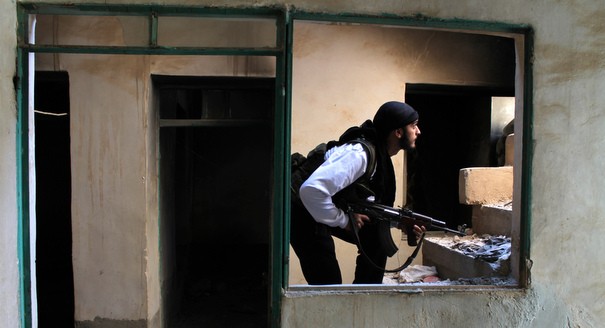This is the fourth piece in a series on the Islamic Front, the largest alliance of rebel groups fighting Bashar al-Assad’s government in Syria. The first post can be found here, the second post here, and the third here.
In the words of its manifesto, the Islamic Front wants “to establish an independent state where God’s merciful law is sovereign and where the individuals of this state enjoy justice and a dignified life.”
A commitment to some variety of religious law is, of course, everyday fare for fundamentalists. But many in the contemporary Islamist movement, most notably the Muslim Brotherhood and its affiliates, argue that the implementation of sharia law, or Islamic law, must be a gradual process of social reform and public education, to be anchored in electoral victories and a painstakingly constructed political hegemony.
Not so the Islamic Front. It does take the long view in the sense that it argues for social and educational work to help develop the public’s Islamic consciousness, but it also rejects the idea that Syrians could ever be allowed to vote on whether to have sharia law or to what degree. According to the Islamic Front’s Salafi-inspired reading of the Quran, letting the people decide would involve placing human desires above God’s political sovereignty—and that’s heresy.
An Islamic State or Nothing
It will therefore come as no surprise that the Islamic Front rejects secularism, which it considers to mean “the separation of religion from life and society, and its confinement to rituals, conventions, and traditions. This is contrary to Islam, which organizes the affairs of the individual, the society, and the state.”
It also spurns the term “civil state” (dawla madaniya), which the Muslim Brotherhood and some other Islamist factions have used to bridge their differences with secular groups and Western allies. According to the Islamic Front’s manifesto, the term is too poorly defined and “misleading.” The front will accept no ambiguity about the goal of an Islamic state.
Democracy and parliamentary rule are also rejected. In the eyes of the Islamic Front, electoral systems are “based on legislation being a right of the people through representative institutions, whereas in Islam, ‘judgment belongs only to God.’” (The latter phrase is from the Quran 12:40, and it is intended here to mean that only God can make laws.)
Theocracy With Checks and Balances
The political head of the Islamic Front, Hassan Abboud of Ahrar al-Sham, a major Salafi militia, argues that an Islamic state would still guarantee a measure of political freedom. “The West suffers from a misconception about Islamists in general,” he said to Al Jazeera English in a recent interview.
In the vision sketched out by Abboud and his fellow ideologues, Syria’s Islamic state will be built on institutions rather than authoritarian rule. No party or individual will have sole control, and there will be laws and courts that monitor the actions of state officials and prevent the undue accumulation of power.
Abboud has also stated that women will be allowed to study and work, as long as this is in accordance with Islamic law. When asked if women will be allowed to drive cars, Abboud scoffed at the question, saying no one in Syria ever suggested otherwise.
No Democracy But Some Voting
“When we refuse democracy, it certainly doesn’t mean that we want an authoritarian, tyrannical, dictatorial, or totalitarian regime that confiscates rights and oppresses the people,” Abboud said to Al Jazeera in December. “Rather, we want a regime built on consultation [shoura] and the participation of the nation [umma], where it can play its role in supervising the ruler.”
In such a system, there could certainly be voting on some matters, for example the appointment of officials and the allocation of resources, as long as no action is taken that could challenge or dilute the supremacy of sharia law.
What Abboud seems to be arguing for, though he probably wouldn’t like the comparison, is something akin to a Sunni version of Iran: a republican theocracy supervised by religious scholars where there is some degree of political competition within sharia-compliant but otherwise modern institutions and where the role of politicians is to administer a strict application of sharia rather than to make laws of their own.
Previous posts in this series:
The Politics of the Islamic Front, Part 1: Structure and Support (January 14, 2014)
The Politics of the Islamic Front, Part 2: An Umbrella Movement (January 15, 2014)
The Politics of the Islamic Front, Part 3: Negotiations (January 16, 2014)






